Shop like the locals, in the wet markets
Updated: 2014-03-14 15:01
By Belle Taylor (China Daily USA)
|
||||||||
When visiting a foreign country, some people like to visit the monuments, others the restaurants while some want to seek out the natural wonders.
I like the supermarkets.
Wallis Simpson, the US socialite who married a British prince, once quipped: "I never make a trip to the United States without visiting a supermarket. To me they are more fascinating than any fashion salon."
She was onto something. Supermarkets give a unique insight to a foreign culture. Forget temples and town halls - if you want to get a real glimpse into how the locals live, check out the cheese aisle in a Paris Carrefour, the frozen pies in an English Tescos and the bewildering array of impossibly perfect fruit in a United States Wholefoods.
There are two supermarkets near my apartment in Beijing. One is called WuMart, and you will find them dotted about the city. On my first visit I stared, awestruck, at the gigantuan noodle and soy sauce aisles. Other shoppers must have thought I was very odd, taking pictures of the giant bottles of baijiu (liquor), studying the various jars of eggs and preserves. But the real treat was in the meat and seafood section, where tanks of fish jostle for space with aquariums full of live bullfrogs. Giant slabs of animal carcass are hung on display and shoppers select from piles of pigs trotters and chicken feet.

WuMart is also notable for what it does not sell. There is no cheese, no Greek yoghurt, no pasta, tinned tomatoes or chickpeas. There is only a tiny amount of milk on offer. One of the hundreds of varieties of tinned fish is probably tuna, but I am yet to determine which.
The other supermarket near me is Ito Yokado, which is actually part of a giant upscale department store. The supermarket is smaller than WuMart's. This is for posh shoppers, with ladies offering samples of the latest brand of frozen dumplings and special displays of hairy crabs during Mid-Autumn Festival and a fancy sushi station.
Ito Yokado has a small selection of foreign goods, and so despite the high prices, I find myself bypassing the ladies shoe department upstairs to make the journey down to the supermarket in the basement to buy wine and passata, capers and cheese.
But the foreign goods aisle is pretty limited. My already small repertoire of recipes was squeezed even tighter.
It was then I discovered the market. Hidden away in a residential complex, I only found it after an in-the-know local led me there. It was a narrow building packed with food stalls. Vegetable sellers with heaving tables of fresh produce, a small butcher and a woman selling eggs and grain. One small stand has a man covered head to toe in flour. He spends his days making fresh noodles and dumpling skins, which you can buy for as little as 3 yuan (48 cents) a bag.
There is a preserves shop, and a husband and wife team who serve up freshly made baozi (steamed stuffed bun) and an odds-and-ends stall, where you can buy everything from a new shower head to a jianzi, a sort of hacky sack ... with feathers.
And finally, I had found the best place to shop. It wasn't the supermarket - it was the secret market. Where you can select the best-looking tomatoes and the ladies stuff a handful of coriander into your shopping bag.
And without my staples of pasta and cheese, I've been forced to expand my repertoire. Making a not bad attempt at jiaozi (dumpling), ginger chicken and more stir fries and fried rice than I care to admit.
I still love supermarkets, but if you really want to get a glimpse into China - shop like a local, find the wet markets.
belletaylor@chinadaily.com.cn
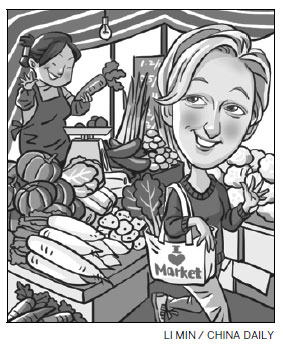
(China Daily USA 03/14/2014 page15)

 Nose gear on plane collapses at Philly airport
Nose gear on plane collapses at Philly airport
 US Black Sea naval drills start near Crimea
US Black Sea naval drills start near Crimea
 Cooperation at the heart of win-win, Li tells world
Cooperation at the heart of win-win, Li tells world
 Prayers for missing flight MH370
Prayers for missing flight MH370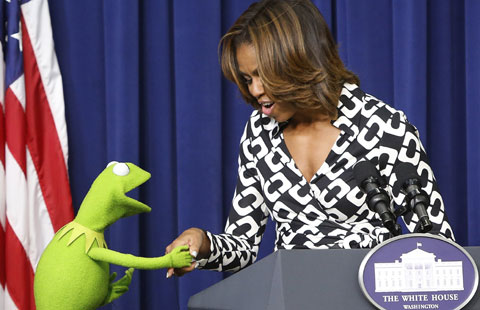
 US first lady promotes film
US first lady promotes film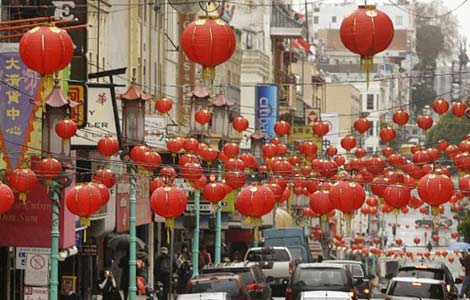
 Who's got the No 1 Chinatown in the US?
Who's got the No 1 Chinatown in the US?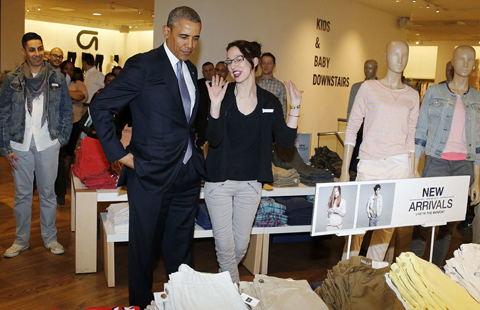
 Obama sweats over sweaters during shopping
Obama sweats over sweaters during shopping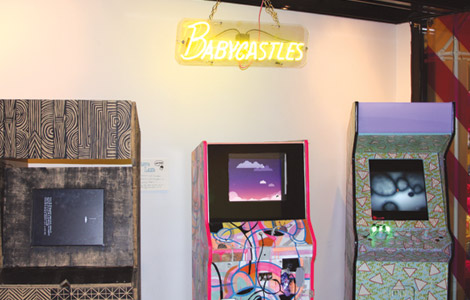
 Chinese arcade games on display
Chinese arcade games on display
Most Viewed
Editor's Picks

|

|

|

|

|

|
Today's Top News
China, US 'should stress' mutual interests
Search for MH370 may expand to Indian Ocean
US warns Russia of 'serious' steps
Feinstein gives a wake-up on spying
Satellite images not of MH370 crash: officials
Nevada woos Chinese investment
China defends South China Sea action
Nobel laureate: Beijing reform policies 'dynamic and flexible'
US Weekly

|

|






